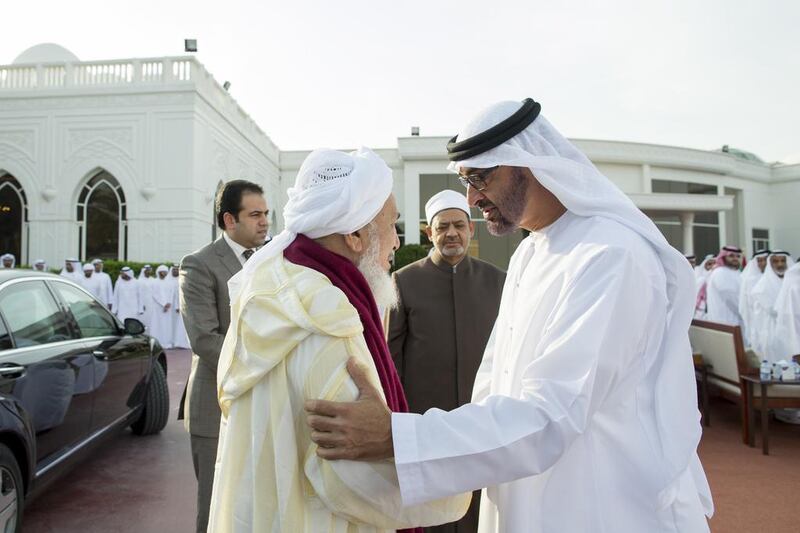ABU DHABI // Better communication, awareness of youth issues and providing Islamic culture in homes and schools are among the suggestions at a forum on achieving peace in Muslim states.
Scholars convened at the Promoting Peace in Muslim Societies forum on Monday with aims to contribute to world peace.
One of the main discussions focused on communication with youth to ensure their stability in their religious beliefs, without the interference of extremist ideologies.
Dr Mufti Mohammed Taqi Usmani, vice president of Jamia Darul Uloom in Karachi, advised honesty and serious dialogue.
“We cannot get out of this forum with words that we give in hopes that our preaching will reach out to the youth,” Dr Usmani said.
“We have to have dialogues with those we preach against, with non-Muslims and extremists. There should be dialogue between us and the youth, and we have to provide them with the right evidence.”
He said some Muslim families had been negligent in providing their children with knowledge of Sharia and Islam.
“Families and scholars need diligence in achieving the Islamic Sharia in the community. Sharia is the basis to our religion,” Dr Usmani said.
Young people felt obliged to take extremist action because of events in the Islamic world, and could be exploited.
“What they see and hear is not what they have read in the books of Sharia. And then advocates take advantage of them, by telling them to take action or they will be sinning,” he said.
Dr Fahmi Jadaan, a professor at Jordan University, agreed with Dr Usmani on the importance of establishing communication and respecting the ideologies of others.
“Dialogue is the way to the solution, it is a main tool in agreements between the parties, even if it is agreeing in differences,” Dr Jadaan said.
“The aim is to start in general agreements and preserve them. But that is not the case today in political and social discussions, which are deliberative democratic dialogues that are based on various opinions.”
Dialogue cannot be achieved by dismissing the other party’s opinions, said Dr Jadaan.
Dr Mohammed Al Rouki, president of Qarawiyyin University in Fes, Morocco, said communication was needed between leaders and the citizens of a state.
“There should be an association that unifies general and public thoughts, to ease fatwas and Islamic understanding,” Dr Al Rouki said.
Rebuilding the mind and heart, he said, was crucial in building healthy communities. He said an immediate return to culture, religion and heritage was needed to rebuild Muslim societies in the right way.
“It is necessary to revive the Islamic laws and traditions that we have known, and revive the intellects who are afraid for their religion and homelands,” he said.
Dr Al Rouki also placed great importance on a return to the Arabic language, explaining how many advocates did not know the laws of Arabic and its grammar, and did not understand the Islamic texts on which they preached.
Dr Radwan Al Sayyid, professor of Islamic studies at the Lebanese University, described two types of power that affected the community as a whole, and suggested each kept to their duties.
He said there was a religious power given to intellectual Islamic scholars, and political authority that dealt with management of public affairs.
Religious legitimacy was causing both powers to want to take the upper hand, said Dr Al Sayyid. He said that created sects and organisations that now look for power through “discriminating people and then killing them”, referring to Jihadists and the Muslim Brotherhood.
“They are now focusing on generating a new Islamic state that asks for reform and enjoining the Good,” said Dr Al Sayyid.
“We have to save our religion in the changing times that we are witnessing. We want to get out of the ambition and greed for power.
“Our religion does not ask for power and authority with the excuse of applying Sharia. We are applying the laws already, and religion is spreading.
“We need a system of good governance. Such a system is what enables the citizens to work with it and by it, not in putting hopes in a delusional and promised state.”
aalkhoori@thenational.ae






